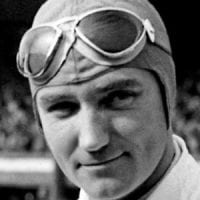Manfred von Brauchitsch was an integral member of the Mercedes-Benz team during the 1930s as Rudi Caracciola’s perennial number two. He scored two major Grand Prix victories but was eventually known as the Pechvogel or “unlucky bird”. Something of a ladies man, he was happy to remain a bachelor and enjoy the life of a GP driver for many years.
Family background and early racing career
The nephew of a Major, he joined the army after leaving school but abandoned that career after a serious motorcycle accident. In hospital for three months, he began competing on hillclimbs in September 1929 with his cousin’s Mercedes SS. Third place finishes with the upgraded SSK in both the Eifelrennen and at Avus during 1931 attracted the attention of Alfred Neubauer. His Mercedes SSKL was a works entry for that year’s German GP – von Brauchitsch retiring from fifth position when the differential failed.
It was the following year’s Avusrennen that propelled von Brauchitsch into national stardom. Mercedes produced streamlined bodywork for this high-speed Berlin motorway circuit and he diced with Caracciola’s Alfa Romeo for the lead. Eventually, von Brauchitsch’s greater engine power helped him to a famous victory.
Grand prix racing with Mercedes-Benz
Mercedes returned to GP racing on a grand scale in 1934 with state funding and orders from Adolf Hitler to bring glory to the new Germany. Caracciola and von Brauchitsch formed the backbone of the team throughout this epic era.
The new Mercedes W25 made its debut in the Eifelrennen and with Caracciola still unfit, it was von Brauchitsch who won after his furious team-mate Luigi Fagioli was ordered to let him pass. However, that season was curtailed by a practice accident before the German GP in which von Brauchitsch broke his arm and five ribs.
Fit again for the 1935 season, he finished second to Caracciola in the French and Belgian GPs having been called to replace the petulant Fagioli at Spa-Francorchamps who had again ignored team orders. Von Brauchitsch seemed set for victory in that year’s German GP when 35 seconds ahead of Tazio Nuvolari’s outdated Alfa Romeo Tipo-B “P3” as they entered the final lap. However, the German’s rear tyre punctured and Nuvolari was through to an unpopular victory for the home crowd. The disappointed von Brauchitsch limped home in fifth position. Mercedes endured a difficult 1936 when outpaced by Auto Union and the brilliant Bernd Rosemeyer.
Grand Prix victories at Monaco and Reims
It responded with the impressive W125 in 1937 and Rosemeyer versus Caracciola again disputed the European Championship. Von Brauchitsch finished third in the Eifelrennen and was second in the German GP and at Pescara, Brno and Donington Park. Unusually, the Monaco GP was held in August that year. And for once, von Brauchitsch ignored team orders to beat Caracciola after a tremendous dice for the lead ended when his team-mate pitted for tyres and fuel.
The autocratic Neubauer temporarily suspended team orders for the poorly supported 1938 French GP and von Brauchitsch passed both Hermann Lang and Caracciola to lead a 1-2-3 for the marque. Another victory seemed assured in the German GP but his car caught fire during its final pitstop. He lost the lead to English team-mate Dick Seaman and crashed without completing another lap when he eventually returned to the track. He then won the Coppa Ciano only to be disqualified for receiving a push start following a spin.
His last GP was the 1939 Yugoslav GP, run on the very day that Britain declared war on Germany. Von Brauchitsch was quickest in qualifying but finished second after spinning out of a safe lead.
Post-war racing return
Von Brauchitsch raced in minor events after the war and retired an AFM from the non-championship 1950 German GP. He defected to East Germany in 1955 with a trial pending for treason in the West, leaving a substantial unpaid tax bill and a wife who committed suicide a year later. Von Brauchitsch eventually worked in East Germany’s Ministry for Sport but had moved back to Stuttgart by the time he died when 97 years old.


